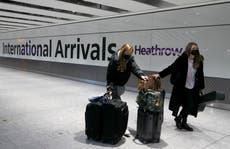Your support helps us to tell the story
From reproductive rights to climate change to Big Tech, The Independent is on the ground when the story is developing. Whether it's investigating the financials of Elon Musk's pro-Trump PAC or producing our latest documentary, 'The A Word', which shines a light on the American women fighting for reproductive rights, we know how important it is to parse out the facts from the messaging.
At such a critical moment in US history, we need reporters on the ground. Your donation allows us to keep sending journalists to speak to both sides of the story.
The Independent is trusted by Americans across the entire political spectrum. And unlike many other quality news outlets, we choose not to lock Americans out of our reporting and analysis with paywalls. We believe quality journalism should be available to everyone, paid for by those who can afford it.
Your support makes all the difference.Travellers arriving in the UK will be required to take two Covid tests while in quarantine under tougher new rules to be announced this week.
The Department of Health and Social Care said the rules were being tightened to prevent new variants of coronavirus from entering the country.
Under the new measures, travellers will have to take Covid tests after their second and eighth day of their 10-day quarantine period. They are already required to show proof of a negative test result no more than 72 hours before departure before they can enter the UK.
A spokesperson said: “Enhancing our testing regime to cover all arrivals while they isolate will provide a further level of protection and enable us to better track any new cases which might be brought into the country, and give us even more opportunities to detect new variants.”
It comes after last week’s announcement that UK nationals returning from coronavirus hotspot destinations will have to carry out mandatory quarantine in government-approved hotels from 15 February.
This will affect an estimated 1,000 UK residents per day returning from high risk “red list” countries, including several South American and African countries where new Covid variants have been detected in large numbers of people.
But with just seven days to go before the rule comes into force, Downing Street revealed today that no contracts have been signed yet with hotel chains to provide rooms for mandatory quarantine.
Boris Johnson’s official spokesperson told a Westminster media briefing: “Last week, the Department of Health issued a commercial specification to hotels near ports and airports.
“This asked for proposals on how they could deliver and manage quarantine facilities. No formal contracts have been awarded yet.”
The government has come under fire for the delays, with Labour's shadow home secretary Nick Thomas Symonds saying it “beggars belief that no agreements have been made with hotels, just a few days before the quarantining system is due to begin”.
Labour leader Sir Keir Starmer also said it was important for the UK to “secure our borders” after concerns were raised that the Oxford/AstraZeneca vaccine may be less effective against the South African variant of coronavirus.
He said: “I think the South African variant is the single biggest risk at the moment. It’s very important therefore that we secure our borders.
“We have known about the South African variant for some time. If you can believe it, it’s going to be 50 days from knowing about the variant to border restrictions, quarantining in hotels, coming in.
“Add to that, and this is probably the most significant things number of other countries we now know have the South African variant, and they are not even in the government scheme for quarantining in hotels.
“This is leaving a back door open at a vital stage in the battle against the virus,” he added.
The prime minister suggested on Monday that border controls could be increased, but only once the UK has brought its own infection rate down significantly.
Mr Johnson said: “They are most effective, border controls, when you’ve got the rate of infection down in your country. For border controls really to make that final difference, so you can isolate new variants as they come in, you need to have infections really much lower so you can track them as they spread.”
Additional reporting by PA






Join our commenting forum
Join thought-provoking conversations, follow other Independent readers and see their replies
Comments